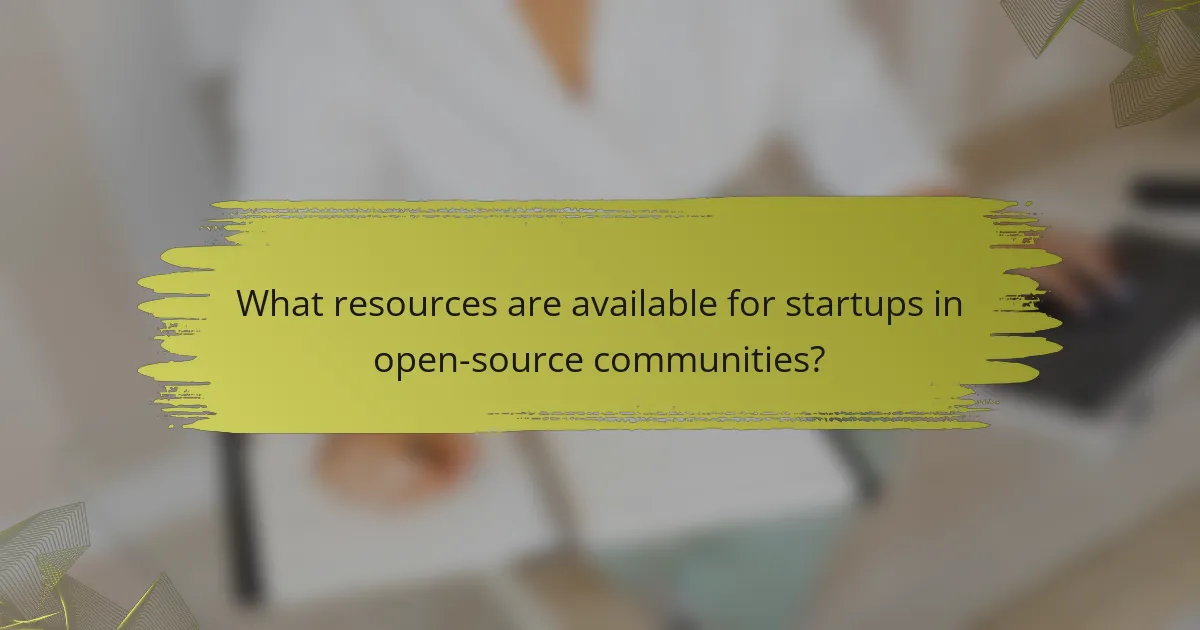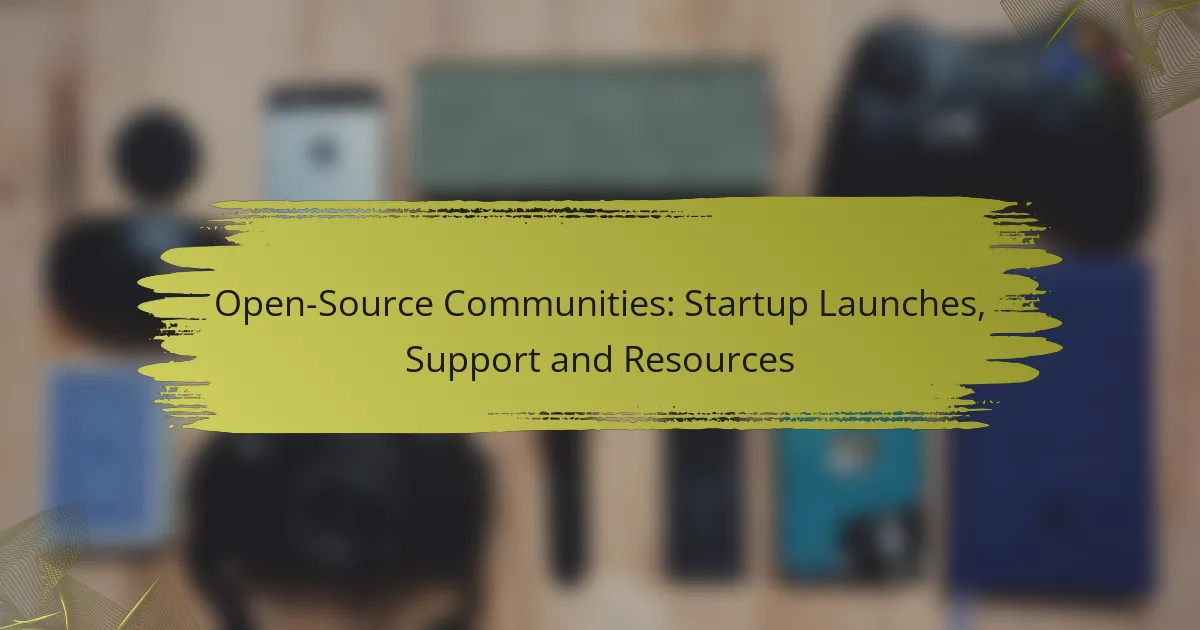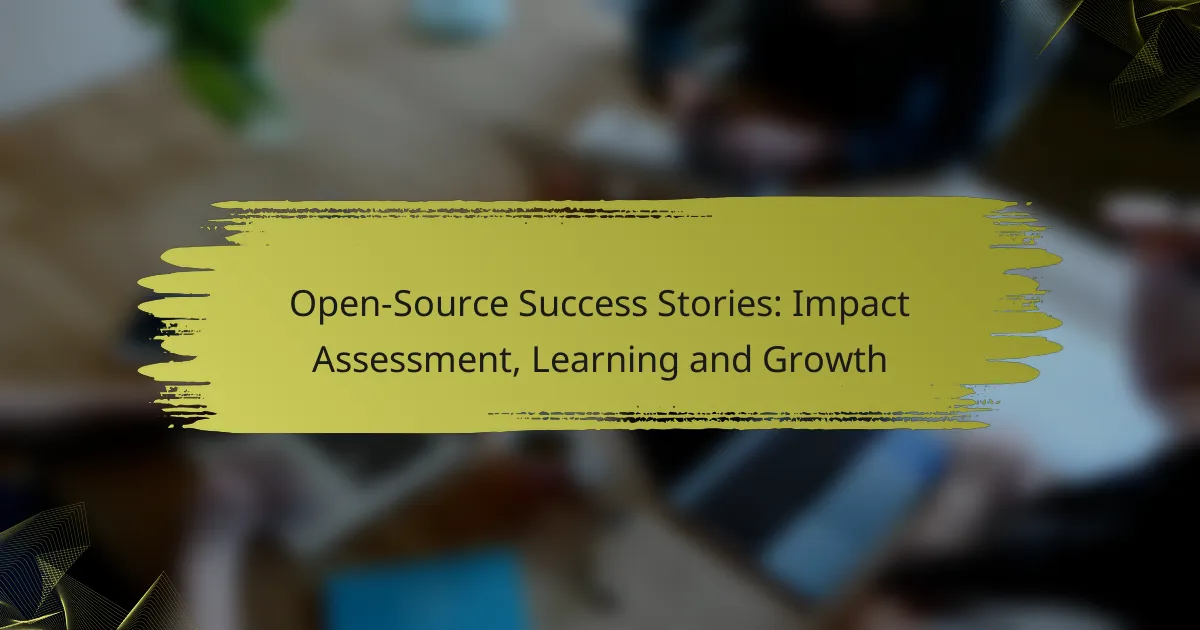Open-source communities play a vital role in supporting startup launches by offering invaluable resources, mentorship, and collaboration opportunities. These communities not only foster innovation but also help reduce development and marketing costs, making them an essential asset for emerging businesses. By leveraging comprehensive documentation, community forums, and online courses, startups can enhance their skills and streamline their operations effectively.

How can open-source communities support startup launches in the US?
Open-source communities provide essential support for startup launches in the US by offering resources, mentorship, and collaboration opportunities. These communities foster innovation and can significantly reduce costs associated with development and marketing.
Access to mentorship programs
Mentorship programs within open-source communities connect startups with experienced professionals who can provide guidance and insights. These mentors often share their knowledge on best practices, project management, and navigating challenges specific to the tech industry.
Startups should actively seek out these programs, as they can offer tailored advice and help refine business strategies. Engaging with mentors can also lead to valuable connections within the industry.
Networking opportunities with investors
Open-source communities often host events where startups can network with potential investors. These gatherings provide a platform to showcase projects and discuss funding needs, which can lead to securing necessary capital.
Participating in these events allows startups to build relationships with investors who are interested in supporting innovative solutions. It’s crucial to prepare a compelling pitch and be ready to discuss the project’s unique value proposition.
Collaborative project development
Collaboration is a cornerstone of open-source communities, enabling startups to work with developers and contributors on shared projects. This collaborative approach can lead to faster development cycles and enhanced product features.
Startups should leverage these opportunities to build a community around their projects, encouraging contributions that can improve the product and expand its reach. Establishing clear communication channels is vital for effective collaboration.
Open-source funding platforms
Open-source funding platforms provide startups with access to financial resources specifically designed for open-source projects. These platforms often allow for crowdfunding or grants that support development efforts without traditional equity dilution.
Startups should explore platforms like GitHub Sponsors or Open Collective, which can help raise funds while maintaining community engagement. It’s important to clearly articulate the project’s goals and how the funds will be utilized to attract potential backers.

What resources are available for startups in open-source communities?
Startups in open-source communities can access a variety of resources that facilitate development, collaboration, and learning. Key resources include comprehensive documentation, community forums for troubleshooting, and online courses that enhance skills and knowledge.
Documentation and tutorials from GitHub
GitHub offers extensive documentation and tutorials that are essential for startups engaging with open-source projects. These resources cover everything from basic repository management to advanced features like GitHub Actions for automation.
Startups should prioritize reading the official guides and exploring the GitHub Learning Lab, which provides hands-on exercises. Utilizing these resources can significantly reduce onboarding time for new team members and improve project efficiency.
Community forums like Stack Overflow
Community forums, particularly Stack Overflow, serve as invaluable platforms for startups seeking support in open-source development. Users can ask specific questions and receive answers from experienced developers, which can help troubleshoot issues quickly.
Engaging actively in these forums can also build a startup’s reputation within the community. Startups should consider contributing answers to common questions, as this can enhance visibility and foster connections with potential collaborators.
Online courses on Coursera
Coursera offers a range of online courses tailored to open-source technologies, which can be beneficial for startups looking to upskill their teams. Courses often cover popular programming languages, frameworks, and best practices in open-source development.
Startups should evaluate course ratings and reviews to select the most relevant options. Investing in team education through these courses can lead to improved project outcomes and a stronger understanding of open-source principles.

Which open-source tools can enhance startup productivity?
Open-source tools can significantly boost startup productivity by providing cost-effective solutions for various operational needs. Utilizing these tools can streamline processes, improve collaboration, and enhance project management without the burden of high licensing fees.
Project management with Trello
Trello is a visual project management tool that helps teams organize tasks using boards, lists, and cards. Startups can easily track progress, assign responsibilities, and set deadlines, making it ideal for agile workflows.
To maximize Trello’s effectiveness, create boards for different projects and use labels to categorize tasks. Regularly update the cards to reflect progress and ensure team members are aligned. Avoid overcrowding boards with too many tasks to maintain clarity.
Version control using Git
Git is a widely-used version control system that allows teams to manage changes to code efficiently. It enables multiple developers to work on the same project simultaneously without conflicts, making it essential for software startups.
To implement Git effectively, establish a branching strategy that suits your team’s workflow, such as Git Flow or trunk-based development. Regularly commit changes with clear messages and encourage code reviews to maintain quality. Be cautious of merge conflicts by frequently syncing with the main branch.
Collaboration via Slack
Slack is a communication platform that facilitates real-time collaboration among team members. Startups can create channels for different projects or topics, ensuring that discussions remain organized and accessible.
To enhance productivity on Slack, set clear guidelines for channel usage and encourage the use of threads to keep conversations focused. Integrate other tools like Google Drive or GitHub to centralize resources and updates. Avoid excessive notifications by muting channels that are not immediately relevant to your work.

What are the benefits of joining open-source communities?
Joining open-source communities offers numerous advantages, including skill enhancement, increased visibility for startups, and access to a broad talent pool. These communities foster collaboration and innovation, making them valuable for both individual developers and emerging businesses.
Skill development through real projects
Participating in open-source projects allows individuals to work on practical, real-world applications. This hands-on experience is invaluable for honing technical skills and learning new programming languages or tools.
Moreover, contributors often receive feedback from experienced developers, which accelerates learning. Engaging in code reviews and discussions can deepen understanding and improve coding practices.
Increased visibility for startups
For startups, being active in open-source communities can significantly boost visibility. By contributing to well-known projects or creating their own, startups can showcase their expertise and attract potential customers or investors.
Additionally, a strong presence in these communities can lead to partnerships and collaborations, enhancing credibility and fostering growth. Startups should focus on sharing valuable insights and solutions to gain recognition.
Access to a diverse talent pool
Open-source communities attract a wide range of contributors from various backgrounds and skill levels. This diversity allows startups to tap into a rich talent pool, making it easier to find individuals with the right expertise for specific projects.
Startups can benefit from this by actively engaging with community members, offering internships, or hosting hackathons to identify potential hires. Building relationships within these communities can lead to long-term collaborations and innovative solutions.

How do open-source communities foster innovation?
Open-source communities drive innovation by promoting collaboration, sharing knowledge, and leveraging diverse skill sets. These environments encourage individuals to contribute ideas and solutions, leading to rapid advancements in technology and processes.
Encouraging collaborative problem-solving
Open-source communities thrive on collective intelligence, where members collaborate to tackle complex challenges. This collaboration often leads to more effective solutions than those developed in isolation, as different perspectives contribute to a richer understanding of the problem.
For instance, platforms like GitHub allow developers to work together on projects, providing feedback and suggestions that enhance the final product. This shared approach not only improves problem-solving but also fosters a sense of belonging among contributors.
Rapid prototyping of ideas
Open-source communities facilitate rapid prototyping by allowing members to quickly test and iterate on ideas. With access to shared resources and tools, developers can create and modify prototypes in a fraction of the time it would take in traditional settings.
For example, using frameworks like React or Django, developers can build functional prototypes within days, enabling them to gather user feedback early in the process. This iterative cycle helps refine concepts and ensures that the final product aligns closely with user needs.



